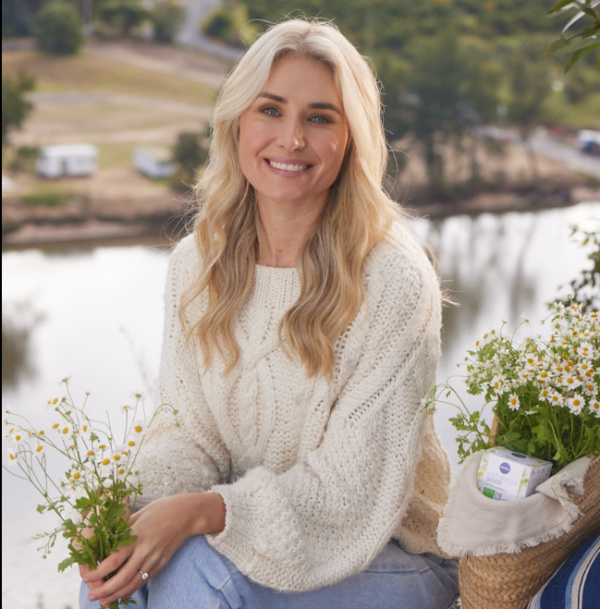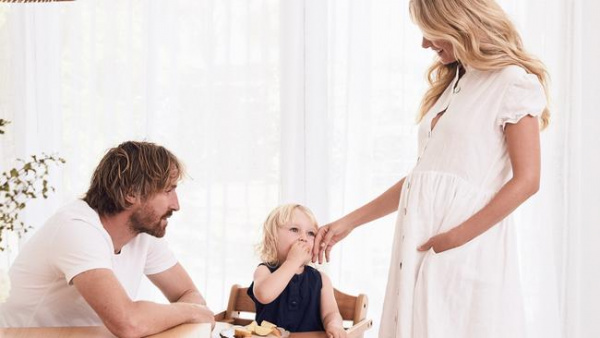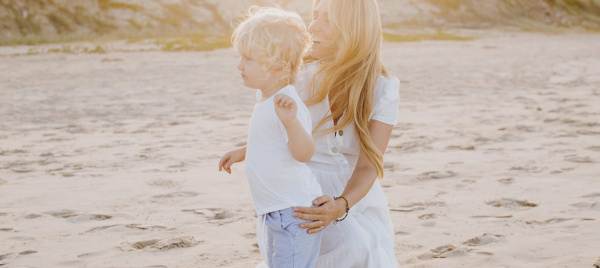
Magdalena Roze has an inspiring way of looking at the world and we are here for it. Image supplied
- Culture
Magdalena Roze on the impact of connecting to food and nature
By Jenny Ringland
Magdalena Roze believes in the connection between the everyday lifestyle decisions we all make, and how they impact our wellbeing, health and the environment. Over the years of living in Byron Bay she and her husband Darren Roberston and their two sons have carved out a way of life that many of us can only dream of (especially now in this post-covid world). It’s her curious approach to living sustainably and her instinct to lean in to the things she loves that we applaud her for, from starting her own food company, Oofoods to nurturing new mums in the fragile postpartum period.
Is living in Byron everything you hoped? What has it been like over the last 18 months during the pandemic?
The change of pace, amazing community, connection to food and approach to life here has exceeded what I imagined. I love where we are and the pandemic has actually brought to light how important all these things are – that is, looking after your health, having a strong local community, having a connection to local food and a slower pace of life. Life for us didn’t change a huge amount during the pandemic. Our businesses were heavily affected of course with the closure of our restaurants, but once we came to terms with the grief around that we just focused on the positives, which is more family time. Since coffees were take away, we created a “car boot cafe” in the back of Daz’s car and set up a little table where the kids loved having their breakfast and babyccinos!
The value of connection and community were really brought to light during the pandemic too. When there were fears around food shortages in the media, suddenly we all had to start thinking about where our food comes from and the logistics around how it gets here (even with things like border closures). And this alone hit home how valuable, sustainable having a relationship with the local baker and sourcing food from local producers really is. The community here pulled together.
Your career has evolved so much since we last spoke to you when you had just moved to Byron, can you tell us about how your focus has shifted and what you love about it?
My focus is definitely on family first and I work around that. I feel very fortunate to have the flexibility to work on different days and hours depending on our needs – and I really love the diversity of the work that I do now! Essentially, by moving up here I’ve had to switch up what I do in the media and I’ve combined it with my passion for food and the environment. Some of my work includes my traditional skills in presenting and journalism, as well as recipe writing (and a cookbook), while other projects are fulfilling brand collaborations whilst starting my own food company, “Oofoods”, with my business partner Katie Graham.

We know you are a big fan of weekly farmer’s markets, what do you love about it, and what have you learnt on your weekly visits?
The best part is the quality, diversity and freshness of the produce – it really is soul food and tastes amazing. I love the nuances around things like how the flavour of the milk or strawberries change depending on the weather and season. The fact that there are certain fruits and vegetables that you can’t get all year round makes you crave and appreciate them when they’re peaking like blueberries, mangos and the first cherries! When those gorgeous big, sweet, heirloom buffalo tomatoes make an appearance just before summer it immediately inspires me to grab some mozzarella, olive oil, sourdough and basil which are all available from the markets. I just so appreciate knowing that the whole meal comes from the local area. I know the people that grew or produced the ingredients and feel so nourished for it. I think it’s important to support these people and local farms directly too. It’s open air, there’s a band playing and plenty of conversation. It was another thing that, apart from wearing a mask, changed very little during the pandemic so it was great to have something grounding to go to every week.
We love your passion for food and making nutritious food for your family. What role does making meals from scratch have in a sustainable outlook on life?
I think that one of the key defining acts to eating better, is cooking more. It does take time which can mean a bit of a re-adjustment around your schedule and certain habits, but ultimately it’s for the better. Cooking from scratch is not only more nourishing since the food is fresh (and according to Ayurveda has “lifeforce”) but you know exactly what’s in it. For me, wholesome food is less about cutting things out and more a philosophy around simply enjoying real food. In the long run, it’s also cheaper as you’re more likely to use up the whole ingredient. For me, cooking is not just about eating better from a health point of view, the culture around eating is just as important. How we connect as a family,, involve the children and converse all play a part in building a positive relationship with food and creating good food foundations for life.


your passion for nurturing mums during the post-partum period and beyond is inspiring, tell us about how important it is and what you have learned
My postnatal experiences with my two children were very different and much of this came down to self care and how I nourished myself. My first birth was very challenging as was breast feeding. A year or two on, I was exhausted and couldn’t help but think that this shouldn’t be my normal. I had so many questions and I put my journalist hat on and started to research. I connected with a bunch of incredible practitioners like my acupuncturist, Marlene, and postnatal depletion expert, Dr Oscar Serrallach, who not only provided me with support but a lot of wisdom around the postnatal experience. I learned about replenishing my stores after pregnancy and birth, and how to nourish myself with rest, wholefoods and practises that traditional societies in places like China and India have been doing for thousands of years.
I adopted a lot of this for my second birth and the positive difference to my wellbeing, milk supply, mood and overall recovery was incredible. While I’m not an expert in this field, the food and recipe side really interested me, so I’ve shared some of my favourites on my website, and I’d love to put these in a book! In Western society, there can be a lot of focus on baby (and not mum) or post-baby bodies and “bouncing back”. I’m passionate about shifting the conversation to one that’s more supportive, creating a community around new mothers, and honouring those sacred few weeks after birth.
What does living a sustainable life mean for you? What does it look like? And has that changed much over the last couple of years, the longer you live out of the city?
Having studied Atmospheric Science, sustainability is something that has been at the forefront of my mind for a while. Actually, it goes back a bit further, I was the President of the Conservation Club in primary school and I remember in the ‘80’s there was a lot of talk in the media around the depletion of the ozone layer and it really affected me. As an adult and especially over the last few years, I’ve become a lot more conscious about my everyday lifestyle decisions and how they impact my wellbeing, my health, my family and the environment. A lot of this is to do with becoming a mum as well as making the sea change to Byron Bay, where we have a closer connection to nature, the food system and how our own actions impact things. Things like sourcing food and cooking come very naturally to us, but I’ve also started to question and think about the many different products I use around the home and on my body. When we have a connection to food and nature, sustainable actions start to make more sense. For example, composting to feed the soil that feeds the produce. It’s hard to do this stuff when it’s not in front of us or when we don’t see it. But when we do, we can’t ignore it.
You are an ambassador for NIVEA, what made you say yes to the opportunity?
Yes! I partnered with NIVEA on the Naturally Good Range because we have shared values around skincare that cares for the skin and the planet; using up to 99 per cent naturally derived ingredients as possible and more responsible, planet friendly packaging. This was a big decision for me and I did a lot of research around not only NIVEA’s, but it’s parent company Biersdorf’s, commitment towards sustainability to make sure that the sustainability goals were significant and long term (the reports are available online). The Naturally Good range is just the beginning and I’m excited to join NIVEA in these early stages of their sustainability journey and seeing the opportunity of how much more we can do, especially since it’s a global and trusted brand.
What does a sustainable skincare routine look like for you?
Taking a less is more approach, not only because it’s better for the planet but I think it works better for my skin in the long run. I’m trying to use products that are more ethical and naturally derived.
Has living in Byron impacted the way you view skincare and beauty?
Yes it definitely has. Unlike my TV days, I barely wear any make up here and so the focus is on healthy, happy skin from the inside and outside. And note, that it’s not “perfect skin”! My approach to beauty is about embracing what I have and nurturing that. And this includes simple, naturally derived, effective skincare, plenty of water, rest and movement that feels good.
